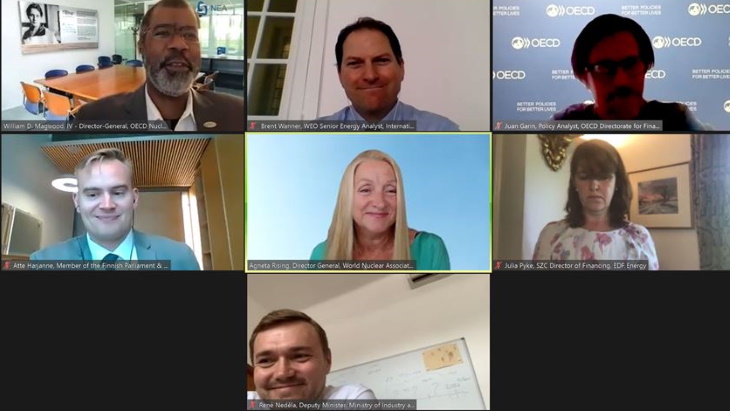Opening the webinar, NEA Director-General William Magwood said the NEA believes that investments made during the COVID-19 pandemic recovery should be made with the long term in mind. "It is possible we can spend a lot of money on the short term that in the long term will not benefit us," he said. "We believe at the NEA that the long-term investments that are made to improve our energy infrastructure to prepare for a low-carbon future should include a consideration of nuclear energy."
He added: "A resilient, reliable electricity infrastructure is absolutely essential today ... but in the long-term future it is going to be even more important. Electricity, in my view, will be the determining factor of economic success in the long-term future. We believe that nuclear can play a very important role in that electricity infrastructure."
Brent Wanner, WEO senior energy analyst at the International Energy Agency (IEA), said: "The COVID-19 pandemic has delivered the biggest global economic shock in peace time since the 1930s, and this has severe impacts on employment and investment in all sectors, including energy." He said an estimated 300 million jobs are at risk globally, with about six million jobs at risk in the energy sector in 2020 out of about 40 million jobs.
"Today, governments are already responding to the economic crisis on a massive scale. More than USD9 trillion has been committed to measures that are mainly based on emergency financial and economic relief to prevent an even deeper crisis. But as we see more stimulus coming and attention shifting to the longer term, it is essential that efforts are aligned with national and global objectives on energy resilience and sustainable development."
René Nedela, deputy minister of industry and trade of the Czech Republic, noted that the country's nuclear power reactors, which together supply about 40% of its electricity, have continued to operate throughout the pandemic. "The good news is there was no shutdown in the Czech Republic caused by COVID-19. That was really important for us," he said. The reactors at the Dukovany and Temelin plants have been taken offline during the pandemic for scheduled maintenance outages, he said, adding, "We did the maintenance without any problems." On nuclear energy's important role in the Czech Republic, he said, "For us, it is a safe and stable source. It will also play a very important role in the future."
"The global coronavirus pandemic will have a long-term impact on all of us, but as we look ahead to the recovery phase, there is a golden opportunity to change and improve, to build a stronger, cleaner and fairer world," said Agneta Rising, director general of World Nuclear Association. She said there are opportunities to deliver a pandemic recovery plan that provides long-term and sustainable economic growth, creates high-value jobs, a cleaner and low-carbon future and ensures that society becomes more resilient. "It is also important that any recovery plans deliver genuine value for money, and investments into existing and new nuclear reactors fulfill all of these requirements."
Rising noted that the long-term operation of existing reactors is the cheapest way to generate decarbonised electricity. Meanwhile, "shovel-ready" new build projects could provide immediate employment. Accelerating the implementation of the 438 reactors that are already planned and proposed by governments, in addition to the 55 reactors currently under construction, would offer significant high-quality jobs and drive economic development, she said. "The global nuclear industry is ready to work with policy makers to deliver the 400 reactors that are already planned and to set greater ambition to meet the climate goals to create the jobs and support sustainable economic growth."
The economic benefits of the Hinkley Point C project in the UK were highlighted by Julia Pyke, Sizewell C director of financing at EDF Energy. She said the socio-economic impact of Hinkley Point C in the UK is "huge". Construction of the plant, comprising two EPR reactors, is providing economic growth, sustained employment and enhanced skills to the UK. Some GBP14 billion will be invested in the UK and 25,000 job opportunities created during the plant's construction. Some 64% of the value of construction contracts will go to UK-based companies. Pyke said there has been a GBP1.7 billion boost to the regional economy during construction so far. EDF Energy is planning to build an "exact copy" of Hinkley Point C at Sizewell C, she added, thereby maximising the benefits from series build.
Governments must ensure that both existing infrastructure and new infrastructure are resilient against not only pandemics, but also against a range of other hazards, such as climate risks, natural disasters and human-made disasters, said Juan Garin, a policy analyst at the OECD's Directorate for Financial and Enterprise Affairs. He said this will require both smart decisions and smart financing. "Smart decisions are to make sure the best projects get built, plus to make sure the most effective use of public funds, while smart financing to ensure public funds go as far as possible with the greatest possible impact."
Magwood noted that while organisations like the IEA and NEA give their opinions, "each national government really has to look at its particular situation carefully and that's where system costs are very important because the resources, the grid, the options are different country to country".















